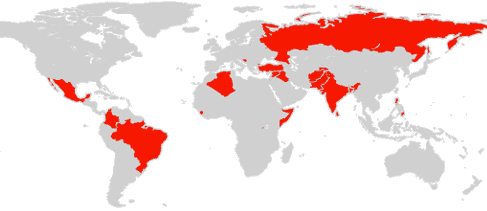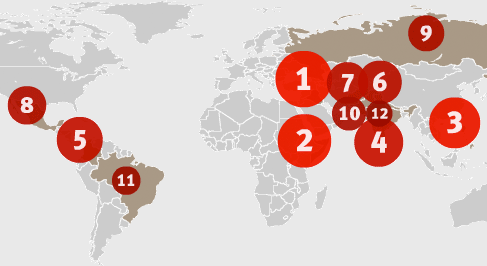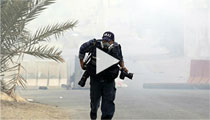The beginning of Vladimir Putin’s third term as president was marked by a crackdown on civil society and critical opinion. Putin signed laws that suppress dissent by limiting public assembly, criminalizing defamation, and authorizing state censorship of critical websites. A Cold War-era chill settled in as lawmakers passed a measure requiring nongovernmental groups receiving international grants to register as “foreign agents,” and the administration expelled the United States Agency for International Development and the United Nations children’s agency. Illustrating the growing climate of intolerance, a court convicted members of a punk band on “hooliganism” charges and sentenced them to prison in connection with an anti-Putin stunt at a Moscow church. Deadly anti-press violence persisted: Assailants in the North Caucasus city of Nalchik gunned down a news anchor for the state-owned broadcaster VGTRK. Authorities made little substantive progress in addressing impunity in previous journalist murders. A former police colonel was sentenced to 11 years in prison on charges of helping plot the 2006 murder of Anna Politkovskaya. Family and colleagues were dismayed that the suspect made a deal with investigators to be tried behind closed doors. And the country’s top criminal investigator threatened a leading newspaper editor in response to a critical commentary.
Russia
» Putin signs laws that criminalize dissent and restrict Internet content.
» Anti-press violence persists; news anchor gunned down in the North Caucasus.
The beginning of Vladimir Putin’s third term as president was marked by a crackdown on civil society and critical opinion. Putin signed laws that suppress dissent by limiting public assembly, criminalizing defamation, and authorizing state censorship of critical websites. A Cold War-era chill settled in as lawmakers passed a measure requiring nongovernmental groups receiving international grants to register as “foreign agents,” and the administration expelled the United States Agency for International Development and the United Nations children’s agency. Illustrating the growing climate of intolerance, a court convicted members of a punk band on “hooliganism” charges and sentenced them to prison in connection with an anti-Putin stunt at a Moscow church. Deadly anti-press violence persisted: Assailants in the North Caucasus city of Nalchik gunned down a news anchor for the state-owned broadcaster VGTRK. Authorities made little substantive progress in addressing impunity in previous journalist murders. A former police colonel was sentenced to 11 years in prison on charges of helping plot the 2006 murder of Anna Politkovskaya. Family and colleagues were dismayed that the suspect made a deal with investigators to be tried behind closed doors. And the country’s top criminal investigator threatened a leading newspaper editor in response to a critical commentary.
-
54
Killed since 1992 -
9th
Impunity Index ranking -
5
Repressive laws -
1
Official threat -
1
Murder conviction
In December, unidentified gunmen killed Kazbek Gekkiyev, a news anchor for the regional affiliate of state-owned broadcaster VGTRK, in the North Caucasus city of Nalchik. He was the 54th journalist killed in direct relation to journalism since 1992, making Russia the world’s fourth deadliest nation for the press during that time period.

| 1. Iraq: 151 2. Philippines: 73 3. Algeria: 60 4. Russia: 54 5. Somalia: 48 6. Pakistan: 48 7. Colombia: 44 | 8. Syria: 30 9. India: 29 10. Mexico: 28 11. Brazil: 24 12. Afghanistan: 24 13. Turkey: 20 14. Bosnia: 19 | 15. Sri Lanka: 19 16. Tajikistan: 17 17. Rwanda: 17 18. Sierra Leone: 16 19. Bangladesh: 13 20. Israel and the Occupied Palestinian Territory: 12 |
With 16 unsolved murders over the past decade, Russia ranks among the worst countries in the world in combating deadly anti-press crime, according to CPJ's Impunity Index. The index calculates unsolved journalist murders as a percentage of each country's population.

| 1. Iraq 2. Somalia 3. Philippines 4. Sri Lanka | 5. Colombia 6. Nepal 7. Afghanistan 8. Mexico | 9. Russia 10. Pakistan 11. Brazil 12. India |
Months into his new term, Putin signed into law a series of measures that suppress dissent.
Public assembly: | In June, Putin signed a measure that imposes steep fines on those who organize or participate in unapproved demonstrations. Penalties could also be imposed against those who take part in approved rallies if their activities go beyond their permit. Fines against organizers run as high as $18,000, a prohibitive sum. |
“Foreign agents”: | In July, the president signed a bill obligating nongovernmental groups that receive funds from abroad to register as “foreign agents.” Such registration is extremely cumbersome. |
Defamation: | Putin also signed legislation that rolled back a 2011 measure that had decriminalized defamation. The new criminal defamation law, signed in July, sets a maximum fine of $150,000, a prohibitive amount for many media outlets. |
Website blocking: | The Internet measure, signed in July, allows the authorities to block sites deemed to have “unlawful content,” which is vaguely defined as “making war propaganda” and “inciting inter-ethnic hatred.” |
Treason: | In November, the president signed a Federal Security Service-proposed bill that expands the definition of high treason and gives the authorities the broad right to criminally charge individuals who consult with foreigners. Local journalists who work for international media could be targeted as a result. |
Russia’s top criminal investigator, Aleksandr Bastrykin, made a graphic threat against Sergey Sokolov, deputy editor of the independent newspaper Novaya Gazeta, in June. Sokolov left the country briefly in fear of attack. The threat followed an opinion piece by Sokolov that said investigators were lenient in their handling of a murder case. Bastrykin later apologized for making the threat. Five Novaya Gazeta journalists have been attacked and killed since 2000.
July 16, 2000: | Igor Domnikov, 42, a reporter and special-projects editor, died two months after being attacked in the entry to his Moscow apartment building. In August 2007, five members of a criminal gang were convicted in the killing; the masterminds were not prosecuted. |
July 3, 2003: | Yuri Schekochikhin, 53, deputy editor, died 12 days after being hospitalized in a Moscow clinic with what doctors said was an acute allergic reaction. He was in the midst of covering a high-level corruption case involving the Federal Security Service and the Prosecutor General’s Office. His colleagues and relatives believe he was poisoned. No one has been prosecuted. |
October 7, 2006: | Anna Politkovskaya, 48, a special correspondent whose coverage of the Chechen conflict won acclaim, was gunned down in the elevator of her Moscow apartment building. Three defendants in the killing were acquitted in 2009. A new investigation has led to charges against five people in all, but the masterminds have not been identified. The case was pending in late year. |
January 19, 2009: | Anastasiya Baburova, 25, a freelance correspondent, and human rights lawyer Stanislav Markelov were gunned down after a news conference. Baburova had contributed articles on activities of neo-Nazi groups and race-motivated crimes. On April 28, 2011, a jury convicted two radical nationalists in the murders. |
July 15, 2009: | Natalya Estemirova, 50, a contributor to Novaya Gazeta who covered human rights abuses in the North Caucasus, was abducted from her Grozny home and murdered. No one has been prosecuted. |
Dmitry Pavlyuchenkov, a retired police official, was sentenced to 11 years in prison on charges that he helped organize the 2006 murder of Anna Politkovskaya, the acclaimed reporter for Novaya Gazeta. Lawyers for Politkovskaya's family said they would appeal the ruling, which came after a closed proceeding. Colleagues and relatives had hoped Pavlyuchenkov would identify the masterminds in open court. Following the verdict, investigators said they considered exiled tycoon Boris Berezovsky and Chechen envoy Akhmed Zakayev to be the masterminds--an assertion dismissed by Politkovskaya's representatives as unfounded and politically motivated. Pavlyuchenkov, who was head of surveillance for Moscow's main police force, had ordered subordinates to follow the journalist and determine her schedule and usual travel routes. The information was then passed along to a gang hired to kill Politkovskaya. Five other suspects faced charges that were pending in late year. Journalist murders have persisted in Russia.

